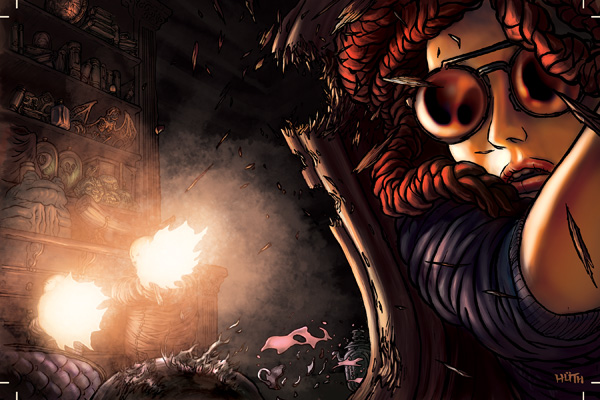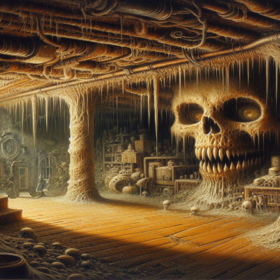See Page XX
Night’s Black Agents: Players and Plots
by John Adamus
This happened to me:
6:30pm EST Okay, I’m sitting at the table, my 4 players are all around me. It’s Thursday night, and I’ve spent the last 3 nights going over every detail of this outline and getting every nuance of the villain in my head. I know the accent I’ll use. I know which powers will annoy which player the most, I know that it’ll be a great 3 hours.
7:15pm EST. Alright, we’ve started, and so far, the players are doing okay. They’re rolling well, and they’ve started looking for clues in sort of the right places. There’s a fight coming up any second once they open that door.
7:17pm EST Okay, they didn’t open the door, but that’s okay, there are other fights on the page. They also missed two clues, but I’m sure they’ll come back for them.
7:31pm EST Why haven’t they gone back to find those two clues? The newest lead they got makes no sense without the context. Wait, why are they spending 2 points of Tradecraft?
7:40pm EST Okay, not the end of the world. They reverse-engineered the two clues. That whole fight is off the table. But they’re about to hit one of the big set pieces; all they need is to just roll some dice poorly.
7:45pm EST They. Didn’t. Roll. Poorly.
7:55pm EST The big fight I thought would slow them down hasn’t slowed them down. Oh great, here’s 3 points of Preparedness and….yes, they have a bazooka.
8:00pm EST Panic John, but don’t make it look like you’re in panic mode. Sure they have 4 of the 9 clues for tonight, and yes, they’ve built this elaborate string theory smoking gun theory that’s totally bananas AND wrong, and yes you have two more hours to fill…..hey let’s order a pizza.
That sort of thing didn’t happen before I got into GUMSHOE games. Before then, it was all Kingdoms of Kalamar and questing paladins with entourages trying to save fiefdoms from goblins and tyranny and whatever consequences my shenanigans as party bard got them into.
Then came GUMSHOE, oddly enough right around the time it was my turn as GM of the group. (Now aside from our twice-monthly Call of Cthulhu game, I’m semi-permanent GM). This has some great pros and some pretty intense cons.
Pros:
- I get to tell my favorite type of story – action-thrillers with detailed conspiracy plots.
- I get to watch my players inhabit and take on roles that they’re so not used to…more modern, more cliché, more action-oriented, it’s just nice to see them happy AND out of the fantasy arena.
- I get to run an elegant system without too much mechanical clutter.
Cons:
- Those detailed conspiracy plots, in my opinion, can’t be as linear as “guys want to rob a bank, so they do” or as simple as “guy 1 gets revenge on guy 2 for sleeping with his wife five years ago”. Detailed plots (that they aren’t going to guess in the first five minutes) take time, and the players expect a certain level of originality from me.
- No matter what the plot is, no matter how detailed, I can’t and won’t railroad them to the scripted page. As badly as I want to scratch that controlling itch, I have to let the players flex and breathe in the world we co-create.
So How Do I Do It? How Has This Game Trumped All Others?
The Tinker Tailor Vampire Die campaign is my most complete, most in-depth and nearly longest running persistent world campaign I’ve ever put together.
Here’s my role: My job is to build the world, put the badguys in it, give the villains an agenda and let the players loose to either chase them down, help them or ignore them. I incent their helping grow the story rather than retard it, and I weed out bad play by pretending they weren’t serious.
I consider myself a “decent” Director. People have played a game with me have said far more glowing things, even when their character dies a horrible death or when they aren’t the center of attention for a night. My plots usually have a formula: Hook, Clue Clue, Lead, Possible Fight, Clue, Clue, Definite Fight, Clue, Final Fight of the Night but my players never tire of it.
It’s not because my clues are extraordinary. They’re household and office items people have seen and take for granted. It’s not even the fights, because they’ve beaten up badguys before. I think it’s because I encourage the extraordinary out of the ordinary.
How?
My players, when the adventure started, were burnt spies. But they weren’t all James Bond, top-of-their-respective-food-chain spies. They were all over the place in terms of hierarchy: everything from middle management, to average cryptologist to night-shift working doctor who just happened to be around one adventure. These details came not from me saying “This is how your character connects to the story” but by asking them, “Okay you’re a [Fill In The Blank Here], you’ve heard what these guys are doing, how are you getting involved?”
Yes, I put all the players on a plane in their first adventure. I wanted them to learn the mechanics and get into a fistfight while the plane dropped down 20,000 feet. And that’s as close to a “tavern” moment as I let them get. The “tavern moment in traditional rpg’s is “All the players gather in a tavern to start the quest” I hate that with a passion hotter than curry. Once they were on the plane, the backstory was all theirs.
And since then, rather than get grandiose info-dumps – where a player monologues for ten minutes about who they are and what they’ve been through, the players began to express their back-stories periodically, the way people do in conversation.
________________________________________________________________
[Two characters are on a boat speeding towards a rendezvous…]
(Character 1 is miming nausea)
Character 2: You okay?
Character 1: I hate boats. Nazis and icebergs sink them. I had a bad experience on a boat.
[time passes, Character ends up on a different boat, in a near-death sword fight with an assassin.]
Character 2: This! This is ANOTHER bad experience on a boat!
________________________________________________________________
Only when I have to throw in an NPC do I dare touch the players’ histories. “Your handler from your old job called,” or “You’re still on one agency email chain, they’re talking about X thing going on”.
Why? Because the world, and its multiple plots and stories, go(es) on even if my players aren’t around. I made that a critical point. Too many times in too many games the players sit as near gods even though they’re ONE pack of knights in ONE country.
By making the world bigger and more filled in than just the players’ tale, their story means more, because it’s THEIR contribution to the big picture. And if their contribution is that they want to derail my plot, then I’ll give them consequences so that they’ll learn to be wary before thinking a character who has survived this long is safe. At the end of ‘Season 1’ of Tinker Tailor Vampire Die, I killed off a very loved character. Yes, the player asked for it and helped me script how she wanted to die, but when the rest of the team saw this sort of event going on, everyone knew the level of seriousness had ratcheted up.
The ordinary items (clothes, personal trinkets, laptops, etc) might have the info the players need to solve tonight’s mystery, BUT those things are owned by a person. Yes Data Recovery will reveal a person’s bank account, but won’t it also reveal pictures of someone’s kids? Or a wishlist of what to do on their next vacation? Finding the human context makes a Clue not just some story-prop, but a world-verifying item.
I do these things: I make the world bigger than the players, I make the ordinary matter more, I show the players consequences that aren’t melodramatic, I let the players guide me through the characters…and they stay hooked.
If your players are wavering, is it because they’re unsatisfied? Are you not meeting their desires? Do you even know what their desires are? Are the plots too clear? Too long? Too messy?
Ask yourself questions not about the specific plot but rather what feedback the players have given you. Use that feedback as both barometer and fuel for further play, and your players will come back to the game again and again wanting more.



